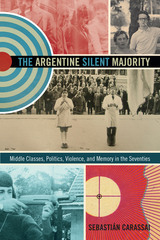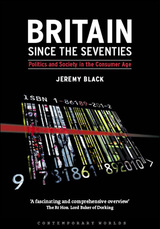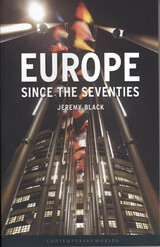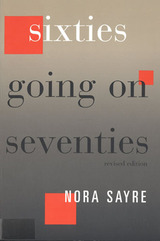


Black’s account of contemporary Britain challenges as well as entertains, seeking to engage the reader in the process of interpretation. Through the lens of the last three decades, the author unveils his image of a country in which uncertainty, contingency and change are the defining features. In charting the impact of increasing individualism, longevity and secularization, Black is drawn repeatedly to examine a fundamental paradox of modern Britain: "At the start of both century and millennium, the British were more prosperous than ever before, but . . . happiness has not risen with prosperity."
Britain since the Seventies is a wide-ranging and cogent evaluation of recent British history, and as such will appeal to all those interested in the condition of modern Britain, and how it came to be so, as well as being an ideal introduction for students of the subject.

In Europe since the Seventies, Jeremy Black offers a succinct and authoritative analysis of the social and economic development of Europe in recent decades.
While providing a full treatment of environmental, demographic, and cultural issues in Europe, Black also offers delineations of broader political, economic, and social matters discussing practical, immediate subjects like migration, crime, transportation, and the environment. Europe since the Seventies reveals how European society has changed strikingly—former societal lines drawn on the basis of economics and class have given way to lines formed by identity, such as gender, sexual orientation, and ethnicity. Meanwhile, the European Union has created an expanded Europe and is now a testing ground for new forms of economics and politics.
A readable, concise, and timely work, this latest book by a notable European historian will be indispensable to anyone wishing to understand the complexities of present-day Europe.

This is a book of journeys, to places--Russia, Hawaii, Italy, Yugoslavia, Greece, the South Seas, the Rhine, Australia, New Zealand, New Mexico--and to the classroom at Duke University where she was Professor of English until her retirement in 1976. Since everything is a journey, the book is concerned with travel of all kinds, in books, in memories, in people living and dead, a lighthearted search for Eden on this planet but a more serious search for survival in the troubled decade of the 1970s.

Among other topics, individual chapters of the book focus on the redefinition of German identity in the music of Kraftwerk, Can, and Neu!; on community and conflict in the music of Amon Düül, Faust, and Ton Steine Scherben; on “cosmic music” and New Age; and on Donna Summer’s and David Bowie’s connections to Germany. Rather than providing a purely musicological or historical account, Krautrock discusses the music as being constructed through performance and articulated through various forms of expressive culture, including communal living, spirituality, and sound.

Nora Sayre guides us through our nation’s transformation during an explosive decade. She explores the landscapes of the era--student strikes at Harvard and Yale, anti-war veterans, John Birchers, Timothy Leary, Yippies and Aquarians, utopias gone wrong, George McGovern, Spiro Agnew, Richard Nixon, George Wallace, black anger in Watts, the media at work, policemen in college, off-off Broadway, the 1972 Democratic and Republican Conventions, and the rebirth of feminism. Sixties Going on Seventies, nominated for a 1974 National Book Award, is also a chronicle of the shattering of cities, the problems of the left, the momentum of the right--and above all, the authentic voices of the people concerned. Sayre recorded all of these events and personalities in exhilarating prose; her witty observations are remarkably fresh today.
Now back in print, this revised edition contains the best of the original volume and brings the commentary up to date, allowing us to view the period with hindsight from the nineties.
READERS
Browse our collection.
PUBLISHERS
See BiblioVault's publisher services.
STUDENT SERVICES
Files for college accessibility offices.
UChicago Accessibility Resources
home | accessibility | search | about | contact us
BiblioVault ® 2001 - 2024
The University of Chicago Press









